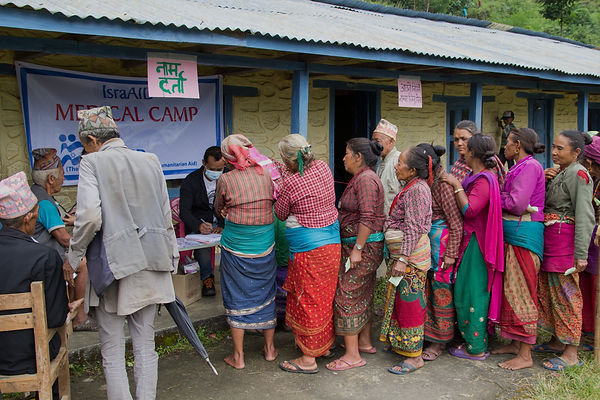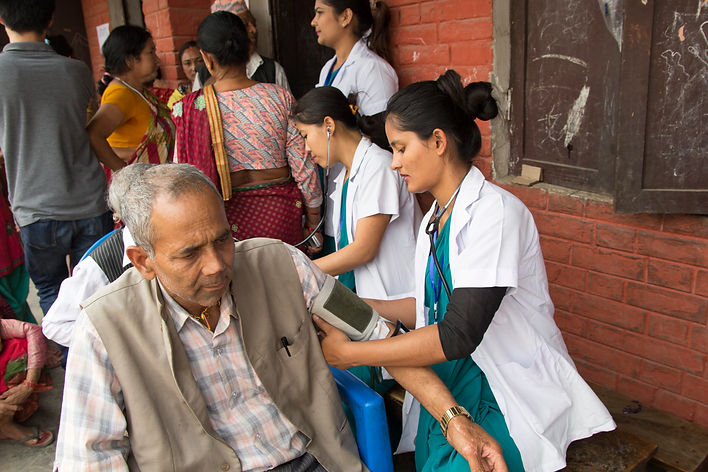
Healthcare Challenges
Due to chronic resource shortages, medical facilities in Nepal are insufficient in both quantity and quality. Medical care is not adequately reaching frail and physically weak children and pregnant women. Moreover, in urban areas, the increasing prevalence of lifestyle diseases is becoming more serious. However, due to low awareness, few patients are seeking medical attention, leading to inadequate assessment of the situation and appropriate interventions. Additionally, the low health literacy among residents contributes to the challenge of not fully preserving the health that should ideally be accessible.
Current Situation in Remote Areas of Nepal
Antenatal care attendance rate for pregnant women:
30.1%
(Nepal Average: 49.8%)
Percentage of Facility-Based Deliveries
14.4%
(Nepal Average: 54.2%)
Diarrhea in Children Under 5 Years
90.7%
(Nepal Average: 38.5%)

Local Project Manager
In cases where breast milk is insufficient, water buffalo milk is given to infants, and appropriate postpartum care is not consistently provided. Additionally, some pregnant individuals are unaware of the availability of prenatal check-ups, leading to instances where they do not attend proper antenatal examinations.
Obesity
18.5%
(Urban:33.5%)
Hypertension
23.8%
(Urban:25.2%)
Hyperlipidemia
10.5%
(Urban:9.7%)

Local NGO staff
Especially in rural areas, lifestyle diseases are not well-recognized, and many individuals who are affected may not be aware and thus do not seek medical attention. Additionally, there is an increasing prevalence of heart diseases as a cause of death, and the impact is becoming more severe each year.
Challenges in Rural Nepal
Challenges for Healthcare Facilities
Limited Number and Remote Locations
Due to economic reasons, healthcare facilities, especially in rural areas, are scarce in Nepal. As a result, there are few medical facilities accessible to the local population. Even if there is a facility a bit further away, many roads leading to these locations are unpaved, making them impassable for regular vehicles. With a lack of public transportation, people often have to walk for hours to reach these facilities. This situation poses a significant burden, particularly for individuals with health issues or pregnant women, making it difficult to seek medical attention when needed.

Limited Capabilities
In rural healthcare facilities, there is a severe and chronic shortage of medical resources, including healthcare professionals, medications, and medical equipment. Highly specialized healthcare professionals are predominantly located in the capital, Kathmandu, and many of them work in private healthcare institutions. This geographical distribution makes it challenging for patients in remote areas to access medical care. Additionally, essential equipment and a variety of medications commonly available in Japan may be lacking, with only a limited selection, frequent shortages, and insufficient services provided.

Fragmented Treatment
In Nepal, when patients visit healthcare institutions, healthcare professionals create paper medical records (patient charts), which are then handed over to the patients. Patients take these paper records home, but in many cases, they forget to bring them back for subsequent appointments. This makes it challenging to provide medical care with a clear understanding of the patient's medical history. Furthermore, without the foundational data for diagnosis and treatment, there is difficulty in coordinating care among healthcare professionals and assessing medication shortages.

Challenges for Residents
Unhealthy Daily Lifestyle
Residents struggle to maintain a healthy daily lifestyle in Nepal. Due to the availability of certain food items and cultural-economic backgrounds, they consistently consume meals high in carbohydrates and fats. Additionally, the limited intake of vegetables and a lack of "exercise" habits contribute to chronic physical inactivity, except for those engaged in manual labor, such as agriculture or construction. Awareness regarding the "unhealthy" aspects of smoking and alcohol consumption is also relatively low. Furthermore, a specific regional challenge is the use of firewood for cooking in many households, leading to respiratory damage.

Difficulty in Making Informed Decisions
Due to the lack of widespread health education, many people in Nepal lack knowledge about health and medical matters. Consequently, there is a reliance on traditional medicine and spiritual healers, which, while valuable, may not provide adequate solutions for clearly identifiable illnesses or injuries. This lack of knowledge hinders individuals from practicing essential self-care and making informed decisions about seeking medical attention when faced with specific health issues, leading to cases where conditions worsen or become critical.




